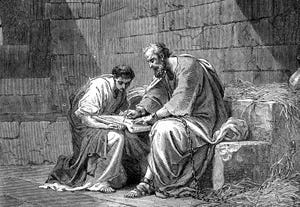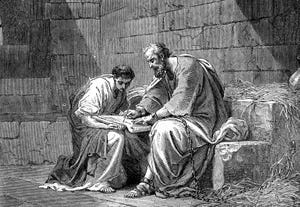Then Paul made his defense: "I have done nothing wrong against the Jewish law or against the temple or against Caesar." (9) Festus, wishing to do the Jews a favor, said to Paul, "Are you willing to go up to Jerusalem and stand trial before me there on these charges?" (10) Paul answered: "I am now standing before Caesar's court, where I ought to be tried. I have not done any wrong to the Jews, as you yourself know very well. (11) If, however, I am guilty of doing anything deserving death, I do not refuse to die. But if the charges brought against me by these Jews are not true, no one has the right to hand me over to them. I appeal to Caesar!" (12) After Festus had conferred with his council, he declared: "You have appealed to Caesar. To Caesar you will go!" Acts 25:8-12
It was an odd thing to think about upon waking.
The apostle Paul was charged with crimes he did not commit; the Jewish authorities came to Caesarea and made accusations they could not prove. Festus wanted to curry favor with the Jews, so he allowed them to bring charges before him.
But Paul, himself a Pharisee in training and experience, knew the real thing on trial was the Gospel of Jesus Christ. In speaking to Festus, he appealed to Caesar.
Upon hearing Paul's testimony (Acts 26), King Agrippa said Paul could have gone free if he hadn't appealed to Caesar.
Paul's life was in danger from certain sects who bound themselves with a blood oath to kill him. The religious leaders were trying to trap him in blasphemy so they could ask Rome to execute him. In fact, from the start of his ministry—meeting Jesus on the Damascus Road while on his way to bring charges against followers of Jesus, being struck blind for a time, having Christians pray for his healing though they were afraid of him—Paul was a controversial figure. Jesus told Ananias that Paul would suffer greatly for the Gospel (Acts 9:16).
Paul was stoned at Lystra and thought dead. The disciples surrounded him, and he got up and walked back into the city that stoned him. Paul knew that prison and hardship awaited him in Jerusalem. Yet he went. The prophet Agabus told Paul that the Holy Spirit showed him that Paul would be bound in Jerusalem and handed over to the Gentiles.
Why did Paul ask to go before Caesar?
The following night the Lord stood near Paul and said, "Take courage! As you have testified about me in Jerusalem, so you must also testify in Rome." Acts 23:11
Why? Because Jesus was sending him to the Gentiles to be a witness to them of Jesus. Paul knew it. He was not afraid. He was ready to give up his life for the Gospel.
Paul was a Jew and a Roman citizen. To appeal to Caesar was to avail himself, as a citizen, of the highest judge in the Roman empire. Paul was going to speak to Caesar about the Gospel.
It may be that Paul thought he would go straight to Rome, but he was delayed for years, and for part of that time, he was in custody and often called to testify to rulers, according to the will of the Lord.
Eventually, Paul got to Rome, rented a house, and lived in peace for two years while he waited for his audience. His last letters were preserved in the Book of Romans in the bible.
Paul finally went before Caesar Nero and was eventually beheaded.
Paul's writings and Luke's testimony of him in the Book of Acts (of the Apostles) comprise nearly half of the New Testament. Paul's ministry resulted in the world's Gentiles learning and believing in the Gospel of Jesus Christ.
I've been acquainted with the story of Paul's life, trials, ministry, and death for a long time. I remember discussing whether Agabus warned Paul not to go to Jerusalem because that was what the Holy Spirit was saying or just prophesied what would happen when he arrived. Some said Paul was not in God's will, and it was his own fault that he died. But Jesus is the one who told him that he would go to Rome to testify.
I came to a personal conclusion—when we are afraid to lose our life for the Gospel, we are more apt to do things that serve and save our flesh bodies, so we are more apt to think that Paul went to Rome on his own in defiance of Agabus's prophecy—so he deserved what he got for disobedience. Why would anyone think this was true? Because if Paul's example of serving Jesus even at the risk of his life is exemplary, we might be called to do the same! Isn't this in keeping with the martyrdom of all the apostles except John the Revelator? Isn't it the example of Jesus, our master?
Some people want to be martyrs. Some accept martyrdom as their ultimate sacrifice to God. Whom would you rather trust:
· Someone who gives his life away frivolously for mistaken zeal, or
· Someone who is serving God, testifying to Jesus, and living life with God's blessing but must now face the enemy that wants to kill them for their faith?
I would choose the second.
Now. Whom would you rather be?
I choose the second.
Why? Because I have lived this life and understand what is in this world. Furthermore, I know nobody gets out of it alive except those here when Jesus returns. We all must be changed—transfigured like Jesus. If we want to be like Him, we must love Him and follow His example because He is leading us to His Father's house.
Paul clearly made his decision, so even when Agabus came and bound him with his own belt and prophesied that he would be arrested in Jerusalem and tried in Rome, Paul did not back down or recant; he was steadfast in his service to Jesus, and had set his face like flint for Rome so that he might do what Jesus commanded him to do.
These are my musings for this early morning. I will leave you with some questions to ask yourself. Feel free to share your answers if you would like.
Have you ever had two choices or left back-door options just in case one didn't work out? Then, after deciding on one, did you think you might have made a mistake? Or have you chosen something, and dropped the subject, so to speak, with yourself?
Shalom.
Pastora Cate




